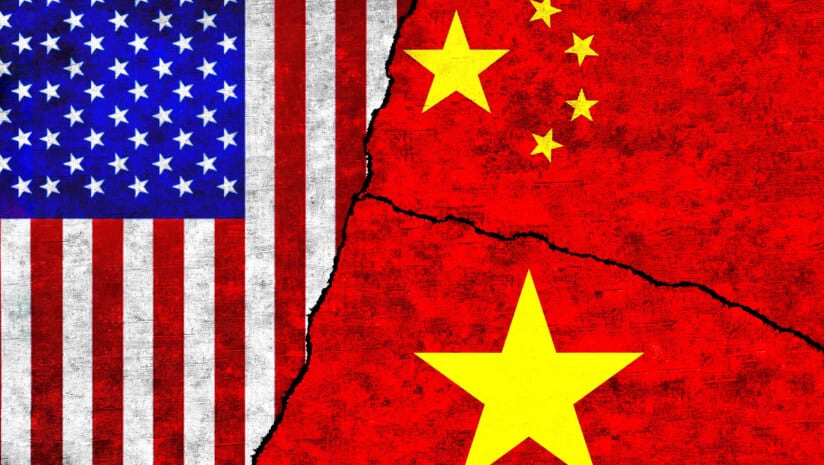An additional 10% tariff is now levied on items from China, while Beijing announced several economic measures targeting the United States.
Most of the world’s basic supplement ingredients like vitamin C, B vitamins, many amino acids, CoQ10 and much more come from China.
“Our weakness is that China is the dominant supplier of many critical nutrients materials,” said Loren Israelsen, founder and president of the United Natural Products Alliance (UNPA). “More importantly, they also have a near monopoly on the starting materials to make the nutrients and other ingredients, so when they control that, they literally have a global reach.”
A 10% tariff against goods from China may be absorbed by the industry and lead to price increases and spur inflation, Dan Richard, vice president of global sales and marketing for natural products manufacturer NOW Health Group, told NutraIngredients-USA.
Although distributors and importers anticipated tariffs and began to stock up on products well before taking effect, Richard said that even with the best preparations, companies will still see their supplies of lower cost goods diminish in the months ahead.
“[The tariffs] are bad business for the U.S. and could lead to people in other countries avoiding ‘made in the U.S.’ brands,” Richard said. “That is a very real threat and our worst-case scenario.”
Cal Bewicke, CEO at California-based Ethical Naturals, said the tariffs will not only affect raw materials but also bottles, capsules, excipients and equipment.
“We’ve been preparing for this for some time: building inventory on core products, working with our customers to place projected order volumes and other measures that will help to maintain cost stability without raising prices,” he said. “I know many companies will absorb whatever costs they can.”
The supply chain crisis three years ago may provide insight into a tariff-filled environment. It led to panic buying and cutting corners on quality specifications that Bewicke predicts could happen in an era of additional tariffs.
Bill Chioffi, chief operating officer at Nammex, a Canada-based supplier of mushrooms grown in China and sold to the North American market, said that his company has not witnessed a “run” on purchasing of goods originating in China.
There is a resurgence of interest in developing domestic supply chains in this new political era, he noted, though for many products homegrown items are not possible.
“The bigger issue here is the new closure of the ‘di minimis’ exemption, which formerly allowed brands to fulfill consumer orders from Canada, Mexico and China under an $800 price point without paying duties related to imports into the U.S.,” Chioffi noted, adding that the exemption means companies will now be forced to import directly into the U.S. and pay tariffs.
Trade organizations respond
Some groups worry about the unintended consequences of the tariffs, including the Consumer Healthcare Products Association (CHPA). It said that many essential ingredients for consumer healthcare products are sourced from countries that specialize in producing high-quality ingredients.
“We urge the Administration to reconsider the recently announced tariffs impacting our industry given the critical importance of consumer healthcare products to American families,” said Scott Melville, the organization’s CEO, said in a statement.
Recent trade relations have not always been frosty between China and the United States. In early 2020 as the COVID-19 pandemic began, the U.S. and China signed a phase one trade deal to address economic imbalances between the countries. The deal intended for China to purchase $200 billion of U.S. products over a two-year period, but the agreement fell apart, said Daniel Mabey, Asia president at UNPA. If it had not, the initial 301 tariffs levied against China under the first Trump administration would have been lowered but President Biden kept the tariffs in place.
“Biden kept the 301 tariffs on, and now Trump’s been adding the additional 10%, so it’s a complicated story,” Mabey said.
Prior to the White House announcement that tariffs impacting Mexico and Canda would be paused, Daniel Fabricant, CEO and president of the Natural Products Association, suggested that tariffs against those countries would not last long if at all.
“That’s been our messaging,” Fabricant told NutraIngredients-USA. “When it comes to China, it’s 10% when some of the previous 301 proposals for [nutraceutical products] were 25%. While this may be a longer negotiation with the People’s Republic of China, it’s starting from a better place. [The tariffs] have been talked about for some time especially along the lines of reshoring initiatives.”
He added that it is tough to determine the costs of tariffs considering the impacts of supply chain challenges due to COVID-19 and port issues at the time, larger drivers of cost fluctuations.
The Council for Responsible Nutrition (CRN) will be conducting a survey of its voting members to better understand how proposed and current tariffs may affect the supplement industry, including potential cost implications across the supply chain.
“We recognize that tariffs—whether on ingredients, manufacturing or packaging materials—are an important issue for the dietary supplement industry,” said Jeff Ventura, vice president of communications at CRN. “Given the evolving nature of trade policy, CRN is actively monitoring these developments and assessing potential impacts on our members.”
The organization declined to provide specific analyses citing that trade policies are still unfolding.
Other tariffs on pause
The Trump administration announced that it would delay U.S. tariffs of 25% against Mexican and Canadian goods which were slated to go into effect on Tuesday.
This came after Mexico’s President Claudia Sheinbaum agreed to immediately send 10,000 Mexican troops to the U.S. border to stop the flow of fentanyl and illegal migrants into the United States, Trump shared on Truth Social. Tariffs against Canada were paused when the country also agreed to boost border enforcement.
NOW does significant business with Canada, and Richard noted the company will not raise prices until it “absolutely must” if the 30-day pause still leads to tariffs. It may run out of some products rather than pay the tariff for imported Canadian goods.
American botanicals such as ginseng or echinacea purpurea from Canada would cause an increase in price for U.S. customers if tariffs impact Canada, said Wilson Lau, president of California-based NuHerbs.
In response to the tariffs, Canada had planned to impose its own against the U.S. which would have included “fat, and oils and their fractions, of fish or marine mammals, whether or not refined but not chemically modified,” according to GOED, the Global Organization for EPA and DHA Omega-3s.
Unlike China and Canada, it is unclear how much U.S. tariffs against Mexico will directly impact the U.S. supplement industry, according NutraIngredients-USA sources. One study indicates that there is a growing shift toward supplement consumptionin Mexico. As for raw ingredients entering the United States, Wilson of NuHerbs suggests potential tariffs will increase the price of imported agave, which is used in supplements as a sweetener and prebiotic fiber.
Tariffs could also affect where items are manufactured.
“Because Canadian businesses also send items grown to the United States for processing and vice versa, these new costs may cause some of the manufacturing to stay in the country of origin,” Lau said. “The impact for those items may be great, especially if there are retaliatory tariffs from those countries, which there likely will be.”



